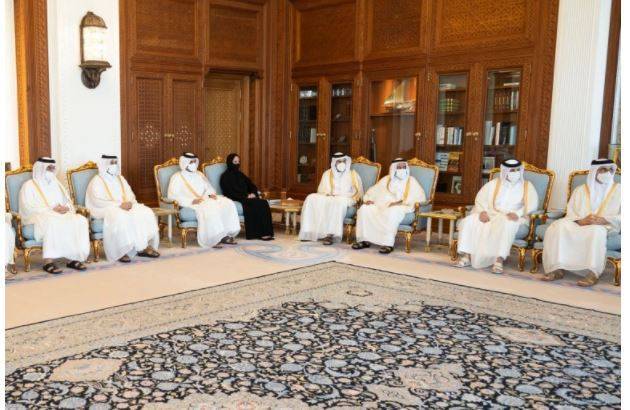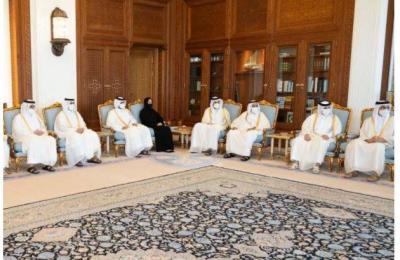Several features and changes marked the ministerial amendments approved by the Amir of Qatar, Sheikh Tamim bin Hamad Al Thani, including new ministers, the division of some ministries, and the renaming of others, while excluding sovereign ministries. The Amir's decree, issued on Tuesday, carries the number 4 of 2021 and approved the separation of four ministries: the Ministry of Culture and Sports, the Ministry of Administrative Development, Labor and Social Affairs, the Ministry of Transport and Communications, and the Ministry of Municipality and Environment. The name of the Ministry of Education and Higher Education was changed to the Ministry of Education, Education, and Higher Education, while the other ministries remained unchanged.
The new amendments in the Council of Ministers included 13 ministries, raising the number of ministerial portfolios in the Qatari government to 18 from 14 previously, including three portfolios assigned to women. The most notable ministerial amendments included the appointment of Ali bin Ahmad Al Kuwari as Minister of Finance, replacing the Minister of Commerce and Industry and the Acting Minister of Finance, and Ghanem bin Shaheen bin Ghanem Al Ghanem as Minister of Awqaf and Islamic Affairs, replacing the Chief of Staff of the Armed Forces.
The amendments mandated the appointment of Sheikh Faleh bin Nasser bin Ahmad bin Ali Al Thani as Minister of Environment and Climate Change, and Abdullah bin Abdulaziz bin Turki Al Subaie as Minister of Municipality, following the splitting of the Ministry of Municipality and Environment, which was a single ministry, and the formation of a new ministry named Environment and Climate Change.
The amendments also included the appointment of Salah bin Ghanem Al Ali as Minister of Sports and Youth, and Sheikh Abdulrahman bin Hamad bin Jassim bin Hamad Al Thani as Minister of Culture, as the Ministry of Culture, Youth, and Sports was divided into two independent ministries: one named Ministry of Culture and the other named Youth and Sports.
Additionally, the amendments appointed Ali bin Saeed bin Tameem Al Marri as Minister of Labor, and Mariam bint Ali bin Nasser Al Misned as Minister of Social Development and Family, as the Ministry of Development and Labor was previously one entity. The name of the Ministry of Education and Higher Education was changed to Ministry of Education, Education, and Higher Education, with Buthaina bint Ali Al Jabr Al Naimi appointed as its minister.
Furthermore, Jassim bin Saif bin Ahmed Al Sulaiti was appointed Minister of Transport, and Muhammad bin Ali bin Muhammad Al Manaai as Minister of Communications and Information Technology, after the previous Ministry of Transport and Communications was unified. The amendments included the appointment of Muhammad bin Abdullah bin Muhammad Al Youssef Al Sulaiti as Minister of State for Cabinet Affairs, a member of the Council of Ministers, following the interim presidency of the position by Issa bin Saad Al Jafali Al Naimi, Minister of Justice.
The council’s amendment did not cover sovereign ministries: Interior (Khalid bin Khalifa bin Abdulaziz Al Thani), Defense (Khalid bin Muhammad Al Attiyah), Foreign Affairs (Sheikh Mohammed bin Abdulrahman Al Thani), as well as the ministries of: Justice (Issa bin Saad Al Jafali Al Naimi), Health (Hanan Muhammad Al Kuwari), Development Planning and Statistics (Salah Muhammad Al Nabit), and State for Energy Affairs (Saad bin Sherida Al Kaabi).
**Effectiveness of Specialization**
Journalist Saleh Gharib viewed the new ministerial amendments as fair to all and restoring matters to their rightful state, as they will enhance governmental performance in light of an elected Shura Council. Gharib stated to Al Jazeera that the separation of certain ministries and giving them specialization will make them more effective in achieving their goals amidst continuous changes both domestically and abroad. He believed that the separation of the Ministry of Culture and Sports would significantly improve the cultural and sports scene in Qatar, especially as the merging had impacted both areas, given their differing objectives and challenges simultaneously.
He praised the renaming process or reverting to previous names for certain ministries, especially the Ministry of Education, Education, and Higher Education, as well as the designation of a Ministry for Environment and Climate Change, particularly in light of Qatar hosting the Doha Expo for Horticulture 2023.
**Three Portfolios for Women**
The new Qatari government features three women: Hanan Muhammad Al Kuwari continues in the Health Ministry; Mariam bint Ali bin Nasser Al Misned leads the Ministry of Social Development and Family; and Buthaina bint Ali Al Jabr Al Naimi heads the Ministry of Education, Education, and Higher Education.
For her part, Faiza Al Kaabi, a member of the Youth Advisory Committee, stated that the presence of three female portfolios in the new government is a positive step after none of the female candidates won in the Shura Council elections. Al Kaabi mentioned to Al Jazeera that this decision empowers Qatari women and highlights their role, as it would inspire many to continue striving for success, especially since the selected names are successful and prominent in society.
She emphasized that the ministerial amendments overall serve the interests of youth by reinstating a dedicated ministry for them, as well as providing significant opportunities for youth to assume leadership positions. Al Kaabi noted that splitting some ministries pleased everyone, as it would facilitate effective governmental work, particularly given that previous merges resulted in many gaps and conflicting mandates, which created significant negative impacts.
This amendment comes ahead of the opening of the first session of the elected Shura Council, which will be inaugurated by Amir of Qatar Sheikh Tamim bin Hamad Al Thani next Tuesday. In this context, the Amir of Qatar issued a decision appointing Lieutenant General Pilot Salem bin Hamad bin Mohammed bin Aqeel Al Nabet as Chief of Staff of the Armed Forces, and established a Civil Service and Government Development Bureau, appointing Abdulaziz bin Nasser bin Mubarak Al Khalifa as its head.




